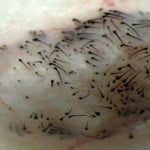
Inhibiting a family of enzymes inside hair follicles that are suspended in a resting state restores hair growth, a new study from researchers at Columbia University Medical Center has found. The research was published today in the online edition ofScience Advances.
In experiments with mouse and human hair follicles, Angela M. Christiano, PhD, and colleagues found that drugs that inhibit the Janus kinase (JAK) family of enzymes promote rapid and robust hair growth when directly applied to the skin.
The study raises the possibility that drugs known as JAK inhibitors could be used to restore hair growth in multiple forms of hair loss such as that induced by male pattern baldness, and additional types that occur when hair follicles are trapped in a resting state. Two JAK inhibitors have been approved by the U.S. Food and Drug Administration. One is approved for treatment of blood diseases (ruxolitinib) and the other for rheumatoid arthritis (tofacitinib). Both are being tested in clinical trials for the treatment of plaque psoriasis and alopecia areata, an autoimmune disease that causes hair loss.
“What we’ve found is promising, though we haven’t yet shown it is effective for male pattern baldness,” said Dr. Christiano. “More work needs to be done to test formulations of JAK inhibitors specially made for the scalp to determine whether they can induce hair growth in humans.”
Christiano and her colleagues serendipitously discovered the effect of JAK inhibitors on hair follicles when they were studying a type of hair loss known as alopecia areata, caused by an autoimmune attack on the hair follicles. Christiano and colleagues reported last year that JAK inhibitors shut off the signal that provokes the autoimmune attack, and that oral forms of the drug restore hair growth in some people with the disorder.
In the course those experiments, Dr. Christiano noticed that mice grew more hair when the drug was applied topically to the skin than when given internally. This suggested JAK inhibitors might have a direct effect on the hair follicles in addition to inhibiting the immune attack.
When the researchers looked more closely at normal mouse hair follicles, they found that JAK inhibitors rapidly awakened resting follicles out of dormancy. Hair follicles do not produce hair constantly but rather by cycling between resting and growing phases.
JAK inhibitors trigger the follicles’ normal reawakening process, the researchers found. Mice treated for five days with one of two JAK inhibitors sprouted new hair within 10 days, greatly accelerating the hair follicle growth phase. No hair grew on untreated control mice in the same time period.
“There are very few compounds that can push hair follicles into their growth cycle so quickly,” said Dr. Christiano. “Some topical agents induce tufts of hair here and there after a few weeks, but very few have such a potent and rapid-acting effect.” The drugs also produce longer hair from human hair follicles grown in culture and on skin grafted onto mice.
It’s likely that the drugs that are so effective in enhancing hair growth in the mice could affect the same pathways in human follicles, suggesting they could induce new hair growth and extend the growth of existing hairs in humans.
It remains to be seen if JAK inhibitors can reawaken hair follicles that have been suspended in a resting state because of androgenetic alopecia (which causes male and female pattern baldness) or other forms of hair loss. So far, all the experiments have been conducted in normal mice and human follicles. Experiments to address hair follicles affected by hair loss disorders are under way.
The title of the paper is: Pharmacologic inhibition of JAK-STAT signaling promotes hair growth. Other CUMC authors: Sivan Harel, Claire Higgins (now at Imperial College London) Jane E. Cerise, Zhenpeng Dai, James C. Chen, and Raphael Clynes (now at Bristol-Myers Squib).
The work was supported in part by the NIH (grants R01AR056016, P30AR044535, T32GM082771 and T32GM007088), Locks of Love Foundation, Alopecia Areata Initiative, and the Dermatology Foundation (Career Development Award).
[SOURCE :-sciencedaily]



